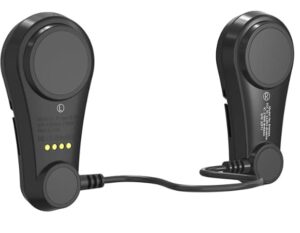When you have a pet and love them like we do, losing them can be devastating and nerve wracking. A few years ago, someone was watching our dog in another city whiler we were at an event, and the dog ran off, and we couldn’t find her anywhere. It was so scary, and fortunately thanks to a local Facebook group for that area, and the woman who became my step mother, we got our dog back safe and sound. GPS tracking can help prevent all that stress. Here are some reasons why you might want a GPS tracker for your pet.

Losing a pet is a nightmare scenario for any pet owner. The sheer panic, the frantic searching, and the agonizing uncertainty can be incredibly stressful. Fortunately, in our increasingly tech-savvy world, a simple device can significantly reduce the risk of this happening: the GPS pet tracker. These devices, often attached to a collar, offer a wealth of benefits beyond simply locating a lost animal, providing peace of mind, enhancing pet safety, and even improving their overall well-being. This comprehensive guide delves into the top 10 benefits of using a GPS tracker for your beloved dog or cat, exploring how they work, what features to look for, and why investing in one is a smart choice for any responsible pet owner.
1. Real-Time Location Tracking: Never Lose Sight of Your Furry Friend
The core benefit of any GPS pet tracker is, of course, its ability to pinpoint your pet’s real-time location. Using a combination of GPS (Global Positioning System) technology, cellular networks, and sometimes Wi-Fi, these trackers provide accurate and up-to-the-minute information about your pet’s whereabouts. This data is usually displayed on a user-friendly smartphone app or web platform, allowing you to see your pet’s location on a map.
Imagine your dog slips his leash during a walk, or your cat, typically an indoor creature, manages to sneak outside. Instead of panicking and relying on posters and desperate social media posts, you can immediately open your GPS tracking app and see exactly where they are. This allows you to quickly and efficiently retrieve them before they get too far or into a dangerous situation.
For dog owners specifically, a canine tracker can be a game changer. Whether your pup loves to explore off-leash or tends to chase after squirrels, a dedicated canine tracker ensures you can keep tabs on their location at all times.
The accuracy of real-time tracking is a crucial factor to consider when choosing a GPS tracker. Look for devices that offer a high degree of precision, especially in areas with dense foliage or tall buildings, which can sometimes interfere with GPS signals. Some trackers also offer location history, allowing you to review your pet’s past movements and identify potential escape routes or favorite hiding spots.
2. Escape Alerts: Proactive Protection Against Runaways
Many GPS pet trackers go beyond simply showing you where your pet is; they actively alert you if your pet has ventured outside a pre-defined safe zone. This feature, often called “geofencing,” allows you to create virtual boundaries around your property, a park, or any other area you consider safe.
If your pet crosses one of these virtual boundaries, you’ll receive an immediate notification on your smartphone or via email. This early warning system allows you to react quickly and potentially prevent your pet from getting lost in the first place.
Geofencing is particularly useful for:
- Preventing escapes: If your dog has a habit of digging under the fence, setting up a geofence around your yard will alert you as soon as they get close to the perimeter.
- Monitoring cats: Indoor cats that sometimes sneak outside can be easily tracked and retrieved before they wander too far.
- Protecting pets during travel: When traveling with your pet, you can set up a temporary geofence around your hotel or campsite to ensure they stay within a safe area.
- Elderly pets: Older pets are more vulnerable; keeping track of them is very important.
When setting up geofences, consider the size and shape of your property and adjust the boundaries accordingly. You can usually create multiple geofences for different locations, such as your home, your workplace, or a dog park.
3. Activity Monitoring: Ensuring a Healthy and Active Lifestyle
Beyond location tracking, many modern GPS pet trackers also incorporate activity monitoring features. These trackers use sensors to measure your pet’s movement, providing valuable insights into their daily activity levels.
Activity monitoring can help you:
- Track steps and distance: See how many steps your pet takes each day and how far they travel.
- Monitor active time: Measure the amount of time your pet spends playing, running, or engaging in other physical activities.
- Track rest periods: Monitor your pet’s sleep patterns and identify any disruptions that might indicate a health problem.
- Set activity goals: Some trackers allow you to set daily or weekly activity goals for your pet and track their progress.
This data can be invaluable for:
- Maintaining a healthy weight: If your pet is gaining weight, you can use the activity data to increase their exercise levels and adjust their diet accordingly.
- Identifying potential health issues: A sudden decrease in activity might indicate pain, illness, or other health problems. This early detection can allow you to seek veterinary care sooner, potentially leading to a better outcome.
- Ensuring adequate exercise: Different breeds and ages have different exercise requirements. Activity monitoring can help you ensure your pet is getting the right amount of physical activity for their needs.
- Providing valuable information to your veterinarian: Sharing activity data with your vet can provide them with a more complete picture of your pet’s overall health and well-being.
4. Lost Pet Recovery: Dramatically Increasing the Chances of a Happy Reunion
In the unfortunate event that your pet does get lost, a GPS tracker can be a game-changer. Instead of relying on luck and hoping for the best, you have a powerful tool to actively search for your missing companion.
Here’s how a GPS tracker can aid in lost pet recovery:
- Real-time location updates: As mentioned earlier, you can track your pet’s movements in real-time, allowing you to follow their trail and narrow down your search area.
- Location history: Review your pet’s past movements to identify potential areas where they might be hiding or traveling.
- Sharing location with others: You can easily share your pet’s location with friends, family, neighbors, and local animal shelters to enlist their help in the search.
- Increased visibility: A GPS tracker can help you locate your pet even in areas where they might be hidden, such as under a bush or inside a building.
- Peace of mind: Knowing that you have a tool to actively search for your lost pet can significantly reduce the stress and anxiety associated with this situation.
The faster you can locate your lost pet, the better the chances of a safe return. A GPS tracker can provide that crucial advantage, helping you bring your furry friend home quickly and safely.
5. Reduced Stress and Anxiety: Peace of Mind for Pet Owners
The fear of losing a pet is a constant worry for many pet owners. A GPS tracker can alleviate this anxiety by providing a sense of security and control.
Knowing that you have a tool to quickly locate your pet if they wander off can significantly reduce your stress levels. You can relax and enjoy your time with your pet without constantly worrying about them escaping or getting lost.
This peace of mind is especially valuable for:
- Owners of escape artists: If your pet has a history of running away, a GPS tracker can provide reassurance and prevent future panic.
- Owners of elderly or sick pets: Knowing you can quickly locate a vulnerable pet if they get lost can provide a sense of security and prevent potentially dangerous situations.
- Owners who travel frequently with their pets: Traveling with pets can be stressful. A GPS tracker can help you keep track of your pet in unfamiliar environments.
- Owners who simply want extra protection: Knowing you have a GPS tracker provides peace of mind and allows you to enjoy your pet’s company without constant worry.
6. Health and Well-being Insights: Proactive Pet Care
As mentioned earlier, activity monitoring features can provide valuable insights into your pet’s health and well-being. By tracking their activity levels, sleep patterns, and other metrics, you can identify potential health problems early on and take proactive steps to address them.
Here are some specific ways a GPS tracker can contribute to your pet’s health:
- Early detection of health issues: A sudden decrease in activity or a change in sleep patterns might indicate pain, illness, or other health problems.
- Weight management: Activity tracking can help you ensure your pet is getting enough exercise to maintain a healthy weight.
- Personalized exercise plans: You can use the activity data to create personalized exercise plans for your pet, taking into account their breed, age, and health condition.
- Improved sleep quality: Monitoring sleep patterns can help you identify and address any issues that might be affecting your pet’s sleep quality.
- Data for veterinary consultations: Sharing activity data with your veterinarian can provide them with a more complete picture of your pet’s overall health and well-being, leading to more accurate diagnoses and treatment plans.
7. Theft Deterrent: An Added Layer of Protection
While GPS pet trackers are primarily designed for lost pet recovery, they can also act as a theft deterrent. If someone attempts to steal your pet, you’ll be able to track their movements and potentially involve law enforcement.
Although pet theft is not as common as other types of theft, it does happen, and it can be devastating for pet owners. A GPS tracker can provide an added layer of protection, making it more difficult for thieves to get away with stealing your beloved companion.
8. Training Aid: Enhancing Recall and Off-Leash Skills
Some pet trainers use GPS trackers as a tool to monitor a dog’s movements during off-leash training and to reinforce recall commands. By tracking the dog’s location and distance from the trainer, they can provide feedback and adjust their training methods accordingly.
A GPS tracker can also be useful for identifying areas where the dog is likely to wander off or become distracted, allowing the trainer to focus their attention on those specific areas.
9. Remote Monitoring: Checking on Your Pet From Anywhere
GPS pet trackers allow you to check on your pet’s location and activity remotely, even when you’re away from home. This can be particularly useful if you’re traveling, working long hours, or simply want to keep an eye on your pet while they’re being cared for by someone else.
You can access the tracking information from your smartphone, tablet, or computer, allowing you to stay connected to your pet no matter where you are.
10. Convenience and Accessibility: User-Friendly Technology
Modern GPS pet trackers are designed to be user-friendly and accessible to pet owners of all technical skill levels. The smartphone apps and web platforms are typically intuitive and easy to navigate, making it simple to set up geofences, track activity levels, and manage your account.
The devices themselves are also designed to be lightweight and comfortable for pets to wear. They attach easily to a collar or harness and are typically waterproof and durable enough to withstand the rigors of daily wear.
Choosing the Right GPS Tracker for Your Pet: Key Considerations
With so many GPS pet trackers on the market, it’s important to choose one that meets your specific needs and budget. Here are some key factors to consider:
- Size and weight: Choose a tracker that is appropriately sized for your pet and comfortable for them to wear.
- Battery life: Consider how often you’ll need to recharge the device. Look for trackers with long battery life, especially if you plan to use them for extended periods.
- Coverage: GPS trackers rely on cellular networks or GPS signals to function. Ensure that the tracker has good coverage in your area. Check the coverage map of the service provider.
- Subscription fees: Many GPS trackers require a monthly or annual subscription to access features like real-time tracking and activity monitoring. Factor these costs into your budget.
- Accuracy: GPS accuracy can be affected by factors such as weather, buildings, and terrain. Read reviews and compare specifications to find a tracker with a high degree of accuracy.
- Durability and water resistance: Choose a tracker that is durable and waterproof, especially if your pet enjoys outdoor activities.
- Features: Consider which features are most important to you, such as geofencing, activity monitoring, location history, and alerts.
- Price: GPS pet trackers range in price from relatively inexpensive to quite expensive. Set a budget and compare prices from different brands.
- Reviews: Read reviews from other pet owners to get a sense of the tracker’s performance, reliability, and ease of use.





